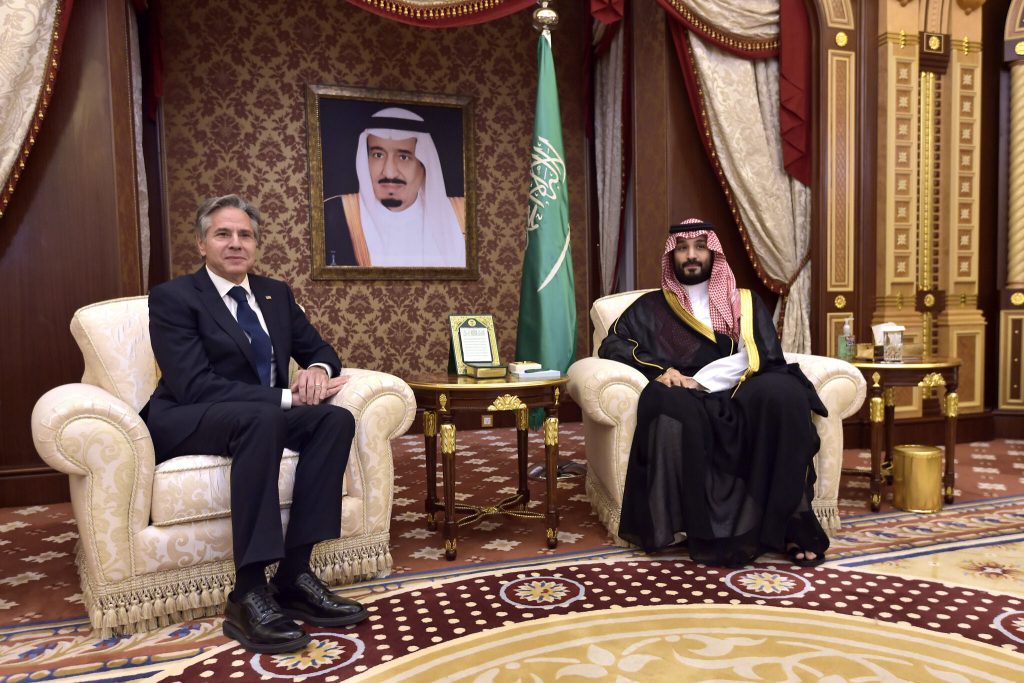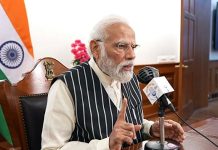
Though US President Joe Biden sent Secretary of State Antony Blinken to Riyadh on June 6 in a bid to repair his country’s deteriorating ties with America’s once close ally in the region, but Saudi Prince has remained non-committal
It is difficult to state whether the dictum that a good general should know how to retreat applies in diplomacy, but in geo-politics it has recently been tried. The US President Joe Biden sent his Secretary of State Antony Blinken to Riyadh on June six, maybe, in a bid to repair his country’s estranged ties with America’s close ally in the region, Saudi Arabia.
It appears that the visit was planned in such a rush that Blinken reached the Saudi capital on the same day Iran’s embassy was opened in Riyadh, perhaps, much against the wishes of Washington. The friendly ties between Iran and Saudi Arabia, and if some détente is worked out with Israel, the presence of the American army in the region becomes irrelevant. The CIA and Pentagon may congratulate themselves that the region may still need American security umbrella, because the present Israeli PM, Benjamin Netanyahu, has unleashed confrontational policies towards Palestine, and secondly, Iran has opened its diplomatic office, but Saudi Arabia is yet to honour its commitment for reciprocation made two months ago in Beijing.
Earlier, on March 10, Iran and Saudi Arabia agreed to restore diplomatic ties seven years after the breakdown of their diplomatic relations. The peace deal, facilitated by China, also included the implementation of a security cooperation agreement signed in 2001 and a 1998 pact to enhance cooperation on trade, investment, technology, and culture. The two countries were in a state of war against each other for the past several years, particularly regarding the issues related to Syria and Yemen. The Chinese Foreign Minister Wang Yi, who had hosted the high power delegations from the two countries, led by Ali Shamkhani, secretary of the Supreme National Security Council of Iran and the Saudi National Security Advisor Musaad bin Mohammed al Aiban, appreciated their ‘sincerity for peace’.
The policy makers did not take into account the visit of Chinese President, Xi Jinping, in December 2022. During his visit, he had visited the Gulf countries, where he had met 14 Arab leaders. In February, 2023, he had hosted Iranian President Ebrahim Raisi. Saudi Arabia is yet to appoint an ambassador or announce a date for its embassy to reopen in Iran, Americans may hope that the Saudis back out from their agreement, but this expectation is too far-fetched.
Improving US-Saudi Ties
Blinken’s trip is taking place at a time, when Saudi Arab’ crown prince Mohammed is being seen disregarding American advice on the production of the crude oil. Riyadh has been ignoring US President Joe Biden on its supply of crude oil to global markets, its willingness to partner with Russia in OPEC plus and reaching a détente with Iran mediated by China are considered a total rebellion against the established US policies in the region.
Since Biden’s inauguration as the President, his relationship with the Saudi Prince was always strained, especially when Biden announced to make Saudi Arabia a “pariah” over the 2018 killing of Washington Post columnist Jamal Khashoggi.
Saudi Arabia, like other Gulf Arab nations, have been relying upon the US to be the security guarantor for the wider Middle East as tensions over Iran’s nuclear program in recent years have spilled over into a series of attacks.
Convergence of Policies
In spite of the improvement in the Saudi Arabia-Iran ties, Saudi leaders are also keen to end the war in Yemen, something also sought by the U.S. The Blinken’s visit to Saudi Arabia also shows that he is more eager to engage internationally, particularly after being involved in prisoner swaps in the Moscow-Ukraine conflict. The kingdom hosted Ukrainian President Volodymyr Zelenskyy in May at an Arab League summit.
It is hoped that after this visit, Washington will leverage its security relationship with Saudi Arabia as it gets warmer towards China and Russia. However, the Saudis point out that Biden can’t provide weapons, when it comes to Congress stopping arms sales to the kingdom.
Interestingly, Deputy Assistant Secretary for Arabian Peninsula Affairs, Daniel Benaim has asserted before the media that “human rights are a pillar of how this administration engages with countries around the world and in this region,” but he declined to discuss specifics. He also questioned whether Blinken would be bringing up human rights issues, including Khashoggi’s death, during the visit.
Instead he indulged in the usual rhetoric of a diplomat, “I think what you’ll see on this trip is the vision of the U.S-Saudi relationship that’s both rooted in our historic mainstays of cooperation in areas like defence and security and counter-terrorism, includes ongoing important regional diplomacy when it comes to Yemen and Sudan, and looks for opportunities for regional de-escalation and regional integration.” However, he betrayed the American concern, when he stated, “We will not leave a vacuum for our strategic competitors in the region.”
During his three-day visit, Blinken met Prince Mohammed, with the State Department saying they discussed their “shared commitment to advance stability, security, and prosperity across the Middle East and beyond.”
Earlier, Biden’s national security adviser, Jake Sullivan, had travelled to Jeddah in May, 2023, to meet Prince Mohammed. Interestingly, during his stay in the country, the prince had also hosted Venezuelan President Nicolás Maduro, a long-time foe of America.
It is difficult to analyse any substantial gain for American diplomacy during Blinken’s visit, as the Yemen war continues despite prisoner swaps and the recent efforts to end the conflict. Meanwhile, both sides likely have wants that won’t be fulfilled. It is yet to be confirmed whether Saudi Arabia has again asked for a nuclear cooperation that includes America allowing it to enrich uranium in the kingdom – something that worries non-proliferation experts as spinning centrifuges opens the door to a possible weapons program. Prince Mohammed has already warned that the kingdom would pursue a nuclear weapon programme, if Iran, a signatory to the non-proliferation treaty, becomes a nuclear power state.
The American concern was expressed during Blinken’s visit to Israel, where he told a meeting of the American Israel Public Affairs Committee that the Biden administration continues to believe “that diplomacy is the best way to verifiably, effectively, and sustainably prevent Iran from getting a nuclear weapon.” However, he added: “All options are on the table to ensure that Iran does not obtain a nuclear weapon.”
It is also believed to be in the Blinken’s agenda to obtain diplomatic recognition of Israel by Saudi Arabia. It is not known whether he could make any breakthrough on this vexed issue, though it appears unlikely at the moment, despite neighbouring Bahrain and the United Arab Emirates recognizing Israel in 2020.
The key to peace in the region remains the issue of Palestine. Saudi Arabia under King Salman has repeatedly called on Israel to allow the Palestinians to create a state in the occupied West Bank, Gaza and east Jerusalem, territories seized by Israel in the 1967 war. However, Netanyahu has adopted religious overtones, thus ending the possibility of ending the conflict in near future. He, however, forgets that Dragon is closely watching the fluid political situation in the region and might be more assertive in future.











